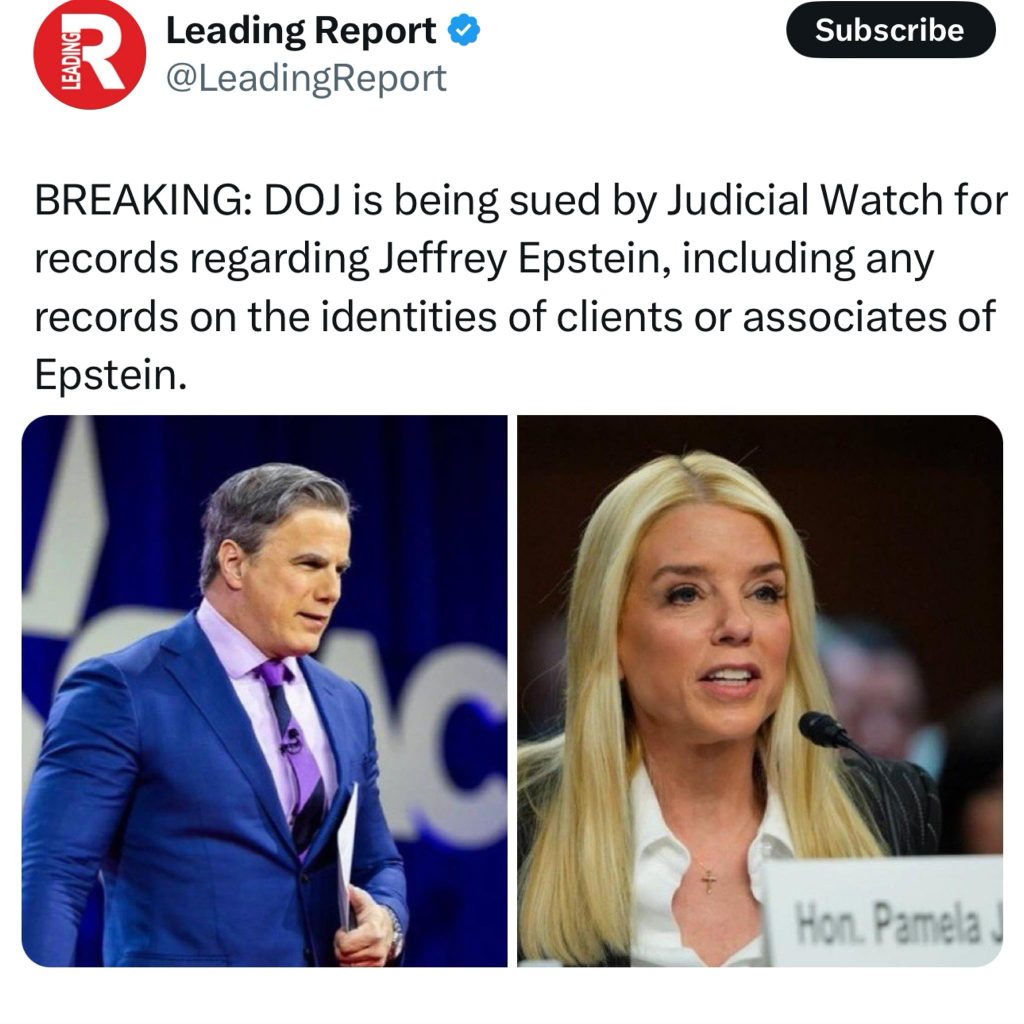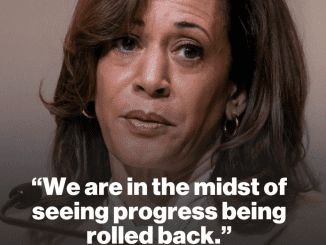Washington, D.C. – April 12, 2025 – In a groundbreaking move that underscores its unwavering commitment to government transparency and accountability, Judicial Watch, a leading nonprofit organization, has filed a lawsuit against the U.S. Department of Justice (DOJ). The lawsuit demands the immediate release of all records related to Jeffrey Epstein, including critical information about the identities of his clients and associates. This legal action marks a pivotal moment in the ongoing quest for truth surrounding one of the most controversial figures in recent history, whose actions and connections have sparked global outrage and intrigue.

A Call for Justice and Transparency
For years, the case of Jeffrey Epstein has captivated the public’s attention, not only because of the heinous crimes he was accused of committing but also due to the lingering questions about the powerful individuals who may have been complicit in his actions. Epstein, a financier and convicted sex offender, was at the center of a sprawling network of influence that allegedly included high-profile figures from politics, business, and entertainment. His death in 2019, under suspicious circumstances, only deepened the mystery and fueled demands for answers.
Judicial Watch, renowned for its relentless pursuit of government accountability, has stepped into the fray with this lawsuit, seeking to compel the DOJ to release all documents pertaining to Epstein. The organization’s mission is clear: to ensure that the American public has access to the truth, no matter how uncomfortable or inconvenient that truth may be for those in power. As a watchdog group, Judicial Watch has a long history of using the Freedom of Information Act (FOIA) and other legal mechanisms to hold government agencies accountable, and this latest action is a testament to its dedication to that cause.
The Lawsuit: What’s at Stake?
The lawsuit filed by Judicial Watch specifically targets records held by the DOJ that relate to Jeffrey Epstein’s activities, including any information about the individuals who were part of his inner circle. This includes clients, associates, and others who may have been involved in or aware of Epstein’s criminal enterprises. The organization argues that the public has a right to know the full extent of Epstein’s network and the potential failures of the justice system in addressing his crimes.
At the heart of this legal action is a broader question about transparency in government. The DOJ, as the nation’s top law enforcement agency, has a responsibility to uphold the principles of justice and openness. Yet, for too long, critical information about Epstein has remained shrouded in secrecy, leaving victims, advocates, and the public at large without the closure they deserve. Judicial Watch’s lawsuit seeks to change that by forcing the DOJ to comply with its legal obligations under FOIA and release the requested records.
The stakes of this lawsuit are immense. The release of these records could potentially reveal new details about Epstein’s operations, including the identities of individuals who have so far escaped scrutiny. It could also shed light on the DOJ’s handling of the Epstein case, raising questions about whether justice was truly served. For the victims of Epstein’s crimes, many of whom have courageously come forward to share their stories, this lawsuit represents a chance for accountability and healing.
Why This Matters Now
The timing of Judicial Watch’s lawsuit is particularly significant. In recent years, there has been a growing movement to hold powerful individuals accountable for their actions, particularly in cases involving sexual abuse and exploitation. The #MeToo movement, for example, has brought renewed attention to the systemic failures that allow predators like Epstein to operate with impunity. At the same time, public trust in government institutions has been eroding, with many Americans feeling that the justice system often protects the elite at the expense of the vulnerable.
The Epstein case is a stark example of these systemic issues. Despite being arrested and charged with serious crimes, Epstein received a lenient plea deal in 2008 that allowed him to serve just 13 months in a county jail, with work release privileges. This deal, which was negotiated by then-U.S. Attorney Alexander Acosta, has been widely criticized as a miscarriage of justice. In the years since, new allegations and lawsuits have continued to emerge, painting a picture of a man who used his wealth and influence to evade accountability for decades.
The public’s demand for answers has only grown louder in the wake of Epstein’s death. Many believe that his suicide in a Manhattan jail cell in 2019 was not a suicide at all, but rather a convenient way to silence him and protect those who were complicit in his crimes. Conspiracy theories abound, and while some may be far-fetched, they reflect a broader sentiment that the full truth about Epstein has yet to be revealed. Judicial Watch’s lawsuit is a direct response to this demand for transparency, aiming to uncover the facts and hold those responsible to account.
Judicial Watch: A Champion of Accountability
For over three decades, Judicial Watch has been at the forefront of the fight for government transparency. Founded in 1994, the organization has built a reputation as a fierce advocate for the public’s right to know. Through its use of FOIA requests, lawsuits, and public advocacy, Judicial Watch has exposed corruption, misconduct, and inefficiency at all levels of government. Its work has led to significant revelations about everything from political scandals to national security issues, earning it widespread respect as a watchdog for the American people.
In the context of the Epstein case, Judicial Watch has already made significant contributions to the public’s understanding of the scandal. The organization has previously obtained documents related to Epstein’s plea deal and the FBI’s investigation into his activities. However, these records have often been heavily redacted, leaving key questions unanswered. With this new lawsuit, Judicial Watch is doubling down on its efforts to uncover the truth, refusing to let the DOJ hide behind claims of confidentiality or national security.
The Broader Implications of the Lawsuit
Beyond the specifics of the Epstein case, Judicial Watch’s lawsuit has broader implications for the principles of transparency and accountability in government. The outcome of this case could set an important precedent for how government agencies handle sensitive information in high-profile cases. If Judicial Watch succeeds in forcing the DOJ to release the Epstein records, it could pave the way for greater openness in other cases where the public interest is at stake.
Moreover, the lawsuit sends a powerful message to government officials that they cannot operate in the shadows. By holding the DOJ accountable, Judicial Watch is reminding those in power that they serve the public, not the other way around. This is particularly important in an era where trust in institutions is at an all-time low. By fighting for transparency, Judicial Watch is helping to rebuild that trust, one lawsuit at a time.
For the victims of Jeffrey Epstein, this lawsuit is about more than just records—it’s about justice. Many of Epstein’s victims have spoken out about the profound impact his actions had on their lives, as well as their frustration with a justice system that failed to protect them. The release of the DOJ’s records could provide them with the validation and closure they have been seeking for years. It could also help ensure that others who were complicit in Epstein’s crimes are finally held accountable.
Join the Fight for Transparency
Judicial Watch is calling on the public to support its efforts to uncover the truth about Jeffrey Epstein. The organization believes that transparency is not just a legal right, but a moral imperative. By shining a light on the Epstein case, Judicial Watch hopes to spark a broader conversation about the need for systemic change in how the justice system handles cases of sexual abuse and exploitation.
There are several ways for the public to get involved. First and foremost, Judicial Watch encourages individuals to stay informed about the progress of the lawsuit. The organization will be providing regular updates through its website, social media channels, and email newsletters. By following these updates, the public can stay engaged and help amplify the call for transparency.
Additionally, Judicial Watch is asking for support in the form of donations and advocacy. As a nonprofit organization, Judicial Watch relies on the generosity of its supporters to fund its legal efforts. Every contribution, no matter how small, helps the organization continue its vital work. The public can also help by spreading the word about the lawsuit and encouraging others to demand accountability from the DOJ.
What’s Next?
As the lawsuit moves forward, Judicial Watch is prepared for a tough legal battle. The DOJ has a history of resisting FOIA requests, often citing exemptions related to privacy or ongoing investigations. However, Judicial Watch has a proven track record of overcoming these obstacles and securing the release of critical information. The organization’s legal team is confident that they have a strong case and is ready to fight for the public’s right to know.
In the meantime, Judicial Watch will continue to investigate the Epstein case through other avenues. The organization has already filed additional FOIA requests with other government agencies, including the FBI and the State Department, in an effort to piece together the full story. These efforts reflect Judicial Watch’s comprehensive approach to uncovering the truth, leaving no stone unturned in its pursuit of justice.
A Legacy of Truth and Accountability
The lawsuit against the DOJ is just the latest chapter in Judicial Watch’s long history of fighting for transparency and accountability. Over the years, the organization has taken on some of the most powerful institutions in the country, from the White House to the Pentagon, and has never backed down in the face of adversity. Its work has had a lasting impact on the American public’s understanding of how their government operates, and this lawsuit promises to be no different.
For those who have followed the Epstein case closely, this lawsuit offers a glimmer of hope that the truth may finally come to light. For the victims, it represents a chance for justice and healing. And for the public at large, it is a reminder of the importance of holding those in power accountable. Judicial Watch’s efforts are a testament to the power of persistence and the enduring value of transparency in a democratic society.


